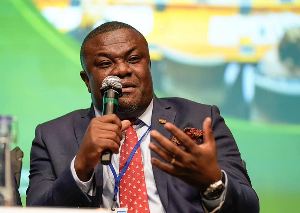Deputy Energy Minister Collins Adomako-Mensah has outlined an ambitious vision for green hydrogen to revolutionise Africa’s renewable energy landscape and help achieve significant emission reduction goals.
At a symposium on green hydrogen adoption in Ghana on Wednesday, he emphasised Ghana's commitment to integrating green hydrogen into its strategic energy framework.
The event was themed: “The future of Green Hydrogen in Sub-Saharan Africa: The Role of Communication, technology and Higher Educational Institutions”.
Mr Adomako-Mensah highlighted Ghana's target of achieving 10% modern renewable energy installed capacity by 2030, showcasing ongoing projects like the 166MW installed solar capacity and the 200MW solar park by the Bui Power Authority.
Additionally, he introduced Ghana’s Energy Transition Framework, which aims for net-zero emissions by 2070.
He noted that under this framework, the country envisions an installed power capacity of 83 gigawatts, with 21 gigawatts from renewable energy sources.
“The potential of green hydrogen in transforming Africa’s renewable energy landscape is immense. Our Energy Transition Framework not only aims for net-zero emissions by 2070 but also sets a roadmap for significant changes in our energy mix,” he said.
According to the framework, more than 70% of road vehicles in Ghana are expected to run on electricity and hydrogen by 2045, with a goal for all road and rail transport to transition to these energy sources by 2070.
This shift underscores the importance of expanding the dialogue around hydrogen as a crucial component of Ghana's emerging hydrogen industry.
The Deputy Minister also acknowledged the pioneering efforts of the P-Learn Centre at the Ghana Communication Technology University (GCTU) in advancing green hydrogen technology research.
“Let's continue to innovate and collaborate for a greener tomorrow,” he urged.
Business News of Friday, 24 May 2024
Source: Jackson Osei Ntiamoah, Contributor













